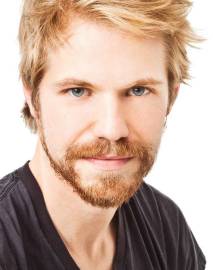 Queer Classics returns to the Hollywood Fringe following their Scenie-winning Fringe Festival Production Of The Year revival of Oscar Wilde’s The Importance Of Being Earnest with an all new, decidedly queer reinvention of William Shakespeare’s Taming Of The Shrew. Founder Casey Kringlen* sat down recently to talk about Queer Classics (Past, Present, and Future). Here’s our chat:
Queer Classics returns to the Hollywood Fringe following their Scenie-winning Fringe Festival Production Of The Year revival of Oscar Wilde’s The Importance Of Being Earnest with an all new, decidedly queer reinvention of William Shakespeare’s Taming Of The Shrew. Founder Casey Kringlen* sat down recently to talk about Queer Classics (Past, Present, and Future). Here’s our chat:
Casey, tell us about Queer Classics? What inspired you to found this new theater company?
If someone had only told me “you can imagine any character you read as any gender or sexual orientation,” my entire education, kindergarten through college, would have been cracked wide open.
How do you mean?
I would have been able to put myself in what I was learning about.
Something you wouldn’t have been able to do otherwise?
I knew I was “different” early on, I was certain I was gay by middle school and came out in high school. No huge trauma along the way, but yet there was no explicit permission to see myself as a gay man in what I was learning. I wasn’t in history, or literature, or even drama. My acceleration in science and math can easily be attributed to it not being about finding yourself in the material. It was void of the need to “relate,” and that, for me, was emotionally satisfying. So part of my mission with Queer Classics is to show through example what no one ever told me as a child.
What makes Queer Classics different from more traditional LGBTQ theaters?
We don’t simply explore LGBTQ issues. We illuminate non-LGBTQ stories for the LGBTQ community and its allies.
How does re-inventing the classics “with a queer bent” speak to both the classics themselves and to the LGBTQ theater community?
I believe God lives in great art and divinity can be mined infinitely. This infinite exploration is key to expanding our understanding of what it is to be human. By taking material that’s stood the test of time and is of immense quality and deeply played, and by dropping queer characters in, we deepen our understanding of humanity and existing while celebrating and illuminating an often oppressed minority community.
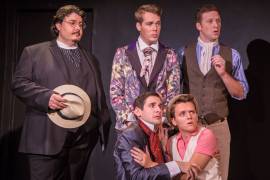 What inspired you to pick The Importance Of Being Earnest as your first L.A. production last year?
What inspired you to pick The Importance Of Being Earnest as your first L.A. production last year?
I saw the “Tea Scene” in a workshop done by two talented women who just weren’t hitting the comedy or cattiness. I immediately thought, “I could show them how this is supposed to go” and quickly realized I had heard gay men talk just like these women, with covert hostility, sophisticated digs wrapped in polite small talk and compliments. I thought it would be such a fun exploration of what can make gay men so gosh-darn funny, all that sass, while also noting that the social-climbing and body shaming that we mock in historic, crusty, upper class societies is alive and well in modern gay Hollywood culture.
How was audience response?
Earnest was certainly a crowd-pleaser. Several folks made it clear that they had seen several versions of the play before but this was their favorite by far. The gayness allowed the comedy to pop in a modern and honest way that audiences loved.
Next up is Shakespeare’s Taming Of The Shrew, which you are billing as “an exploration of gender identification.” How does this differ from your approach with Earnest?
The concept of a “queer lens” offers a broad range of possibilities. With Earnest, we simply made the two main couples same-sex. From that point on it was a celebration of that change not “breaking” the play and often lifting it to new comedic heights.
And Taming Of The Shrew?
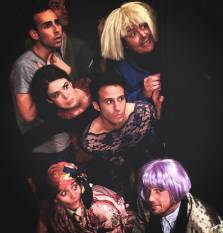 Shrew is completely different. While working on a scene with friends it struck me that Kate’s anger could easily be streaming from not feeling like she had a place in the world, feeling alien in her own body. Thus came the question, “What if Kate was trans and didn’t have the words or thoughts to explore it?” Immediately so many of Kate’s lines and actions were framed in such a way that they made perfect sense. She wasn’t a “shrew.” She was a “he” and didn’t know how to deal with it. As we developed the concept it became clear that Petruchio would be trans as well and would push Kate to accept himself as he is from inside out. Thus this production is more exploration than celebration. Also, the world we created in Earnest was a-okay with gay, and in the world of Shrew, trans is not talked of and certainly not acceptable.
Shrew is completely different. While working on a scene with friends it struck me that Kate’s anger could easily be streaming from not feeling like she had a place in the world, feeling alien in her own body. Thus came the question, “What if Kate was trans and didn’t have the words or thoughts to explore it?” Immediately so many of Kate’s lines and actions were framed in such a way that they made perfect sense. She wasn’t a “shrew.” She was a “he” and didn’t know how to deal with it. As we developed the concept it became clear that Petruchio would be trans as well and would push Kate to accept himself as he is from inside out. Thus this production is more exploration than celebration. Also, the world we created in Earnest was a-okay with gay, and in the world of Shrew, trans is not talked of and certainly not acceptable.
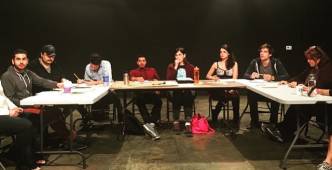 Your casting notice specified that you were looking for trans actors to be part of the Shrew cast. How successful were you at getting who you wanted?
Your casting notice specified that you were looking for trans actors to be part of the Shrew cast. How successful were you at getting who you wanted?
We are so incredibly pleased with all of our actors. We really got lucky as we only had four trans actors audition for the piece. We had a few trans and LGBTQ advisors helping us reach out to the trans community and discovered that comfortability with exploring gender onstage is a challenge and that Shakespeare is daunting to a lot of people. From what I now know I think we would have had many more trans actors turn out if the characters didn’t need to explore their gender. I’m so grateful for the willingness and bravery of the actors we cast.
What can the production’s trans actors bring to the project that cisgender performers might not?
I could not have done this show without trans actors. They are the ones creating the piece and defining the world as we go. I’m simply asking questions and suggesting guideposts on the journey. Since the trans actors are playing characters exploring gender they bring their own experience and knowledge, most of which is new to me. We had hoped to have a few more trans actors playing cisgender characters as well, but we simply did not have enough folks audition.
You picked the Hollywood Fringe Festival to debut both Earnest and Shrew. Why is that?
Fringe allows us to play with bold concepts. The Festival has an energy of exploration and creating fresh works that push the envelope. That being said, the work Queer Classics creates will always be polished and professional. We set a high bar for ourselves and rehearse as if we’re going into a full run.
Why should this year’s Fringe-goers plan to see Taming Of The Shrew with so many other options on the menu?
Fringe patrons should put Shrew at the top of their lists because this show is about the art and the art only. No one puts up a queer Shakespeare play because they’re hoping to get a new agent, or have casting directors discover them, or they want to eventually turn it into a money-making movie. This is art for the sake of art and it’s damn good art. Oh, and it’s freakin’ hilarious. Note to Fringe-goers: You will not be bored!
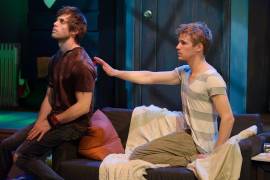 You’re as charismatic a leading man as you are a talented director, and it was as great seeing you light up the stage in the understudy cast of Earnest’s post-Fringe run last year as you did in Expecting To Fly (which won you and Justin Mortelliti a Best Duo Performance Scenie in 2012). Can we expect to see more of you as an actor, or is direction the way you see yourself headed these days?
You’re as charismatic a leading man as you are a talented director, and it was as great seeing you light up the stage in the understudy cast of Earnest’s post-Fringe run last year as you did in Expecting To Fly (which won you and Justin Mortelliti a Best Duo Performance Scenie in 2012). Can we expect to see more of you as an actor, or is direction the way you see yourself headed these days?
For years I denied myself the permission to be a director. As far back as I can remember I would imagine sensational creations of live performance in great detail. My mind as a child was constantly conceiving a dance performance on that grassy hill, or an acrobatic routine on that light pole, or a rocker screaming soaring vocals from that building top.
And did that continue as you grew up?
As I grew, my daydreams became more sophisticated, my concepts more exotic and though I didn’t know it, unique. Yet I never allowed any of my visions to manifest in the world.
And then?
A few years ago, after coaching a friend for an audition during which I created for her an overly sophisticated and specific movement story, she looked at me and said, “Whatever you just did, this is what you should be doing, I’ve never seen it before, and I’ve never seen this version of you. This is what you need to do.”
This must have been quite a moment for you.
It took that drill to my head from my dearest of human companions for me to realize I needed to stop pretending and give myself permission to say, “I have ideas that are worth creating from start to finish.”
After which?
Once I heard that, everything changed. I don’t aspire to act anymore. But I am developing a style with verse text that requires I demonstrate it to actors, and I love it.
So no more acting at all?
I’d say there is a chance I’ll be acting Shakespeare sometime soon. Am I too old to play Juliet? Gosh, I hope that ship hasn’t sailed yet.
Hardly! You’ve obviously made a conscious decision to be out in your career. Have we gotten to a point where this can be considered a plus for an actor, or at the very least not a minus, or do we still have a ways to go?
For actors, we have a ways to go. Ultimately, happiness stems from self-awareness and self-love. I am aware that honesty is one of the pillars of who I am. To be out is to be myself. Some people are unfazed by not talking about their sexuality or keeping things vague in their acting careers. And that’s totally their right as ultimately it should be about the work, not the person.
Is it different for directors?
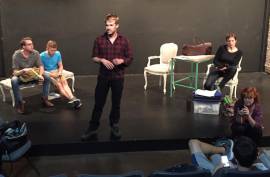 For directors, being out is a plus. The queer community loves to support its artists and self-pride and openness are inspiring traits worthy of support. Queer Classics is made possible by support from many people, but the LGBTQ community represents the majority of our support and funding.
For directors, being out is a plus. The queer community loves to support its artists and self-pride and openness are inspiring traits worthy of support. Queer Classics is made possible by support from many people, but the LGBTQ community represents the majority of our support and funding.
What other classics pique your interest as possible future Queer Classics productions?
Romeo and Juliet is most certainly on my mind, and we had such a blast with Oscar Wilde that we may need to return. And I Love Lucy could use a queerification, don’t you think? We keep the definition of “classics” broad so you never know!
Thanks so much for taking the time to answer these questions! I’m looking forward to seeing Taming Of The Shrew at this year’s Hollywood Fringe!
Thank you!
Taming Of The Shrew—An Exploration Of Gender Expression plays six performances only, June 6 through June 21 at THE OTHER SPACE @ The Actors Company, 916 A North Formosa Ave, West Hollywood
For schedule and reservations, visit:
http://www.hollywoodfringe.org/projects/2349
*Casey Kringlen directed, produced, designed and co-adapted Queer Classics Presents: The Importance of Being Earnest for the 2014 Hollywood Fringe Festival. The show won the Encore Producers Award and was extended twice. He assisted director Jessica Kubzansky on Sheila Callaghan’s new play Everything You Touch at The Boston Court Performing Arts Center. In early 2014, Casey conceived and directed an ‘Equal Love’ version of Romeo and Juliet. The production workshopped in New Orleans and had its LA premiere at The Well in downtown LA, produced by Jeffery Brooks’ Inner Circle Theatre. Casey directed, produced, and designed LA’s first production of Jacob Marley’s Christmas Carol at six01 Studios last year. Casey is also a choreographer and performance art creator/director. He is particularly proud of The Hereafter, a movement piece exploring death, burial rites, and earthly release as seen at The Satellite and Hollywood Fringe. He is also a photographer and holds a BFA in Theatre Performance from Chapman University.
Casey’s headshot by Flaminia Fanale


 Since 2007, Steven Stanley's StageSceneLA.com has spotlighted the best in Southern California theater via reviews, interviews, and its annual StageSceneLA Scenies.
Since 2007, Steven Stanley's StageSceneLA.com has spotlighted the best in Southern California theater via reviews, interviews, and its annual StageSceneLA Scenies.







 COPYRIGHT 2025 STEVEN STANLEY :: DESIGN BY
COPYRIGHT 2025 STEVEN STANLEY :: DESIGN BY